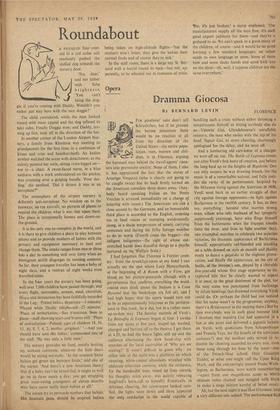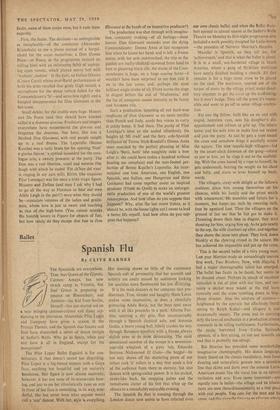Opera
Dramma Giocosa
By BERNARD LEVIN FLORENCE
FOR goodness' sake don't tell Khrushchev, but if he pressed the button tomorrow there would be no reaction at all from the direction of the United States—the entire popu- lation, men, women and chil- eJ dren, is in Florence, arguing the harassed men behind the travel-agents' coun- ters into premature senility. None of them, I take it, has appreciated the fact that the statue of Atnerigo Vespucci (who is clearly not going to be caught twice) has its back firmly turned on the American consulate three doors away. (Any- body heard speaking Italian on the Ponte Vecchio is arrested immediately on a charge of loitering with intent.) The Americans are'.run close second by the Germans, and an honourable third place is accorded to the English,•orderIng tea in loud voices or stumping waistcoatedly along, in a shade temperature of ninety, carrying overcoats and daring the filthy foreign weather to do its worst. (Fourth come the beggars—the indigent indigenous-the sight of whose out- stretched .hands does dreadful things to a psyche nurtured on the Welfare State.) I had forgotten that Florence is Forster coun- try: from the breakfast-room at my hotel I can actually see the spot where Lucy Honeychurch, at the beginning of A Room with a View, got blood. on her picture-postcards .(though With a _perverseness that confirms everything the waist- coated ones think about the Italians it is Casa Howard that the bookshops are full of), and 1 had high hopes that the opera would turn out to be as uointentionally hilarious as the perform- ance in that book. So it did, but in a rather more up-to-date way. The Sunday matinee of Verdi's La .Battaglia di Legnauo began at .four. I awoke from my siesta at five past, leaped up, washed, changed and hurried off to the theatre. I got there at 4.25, to find the house lights still up and the audience alternating the slow hand-clap with
snatches of the local equivalent of 'Why are we waiting?' It wasn't difficult to guess why : on
either side 'of the stalls-was a platform on which
sweating, white-coated attendants wrestled with obdurate television cameras, while the orchestra, for the hundredth time, tuned up (one cOrnist, his, thoughts miles away, was quietly repeating Siegfried's horn-call to himself). Eventually, to delirious cheering, the cameramen looked satis- fied, the lights went down and there appeared the only conductor in the world capable of handling such a crisis without either throwing a temperament himself or letting anybody else do so—Vittorio Gui, Glyndebourne's unruffable maestro, the man who smiles with the top of his head. Signor Gui, to more cheering, charmingly apologised for the delay, and we were off.
And a lumbering old cart-horse of a charger we were off on, too. The Battle of Legnano comes just after Verdi's first burst of creation, just before the long haul up to the heights of Rigoletto. One can only assume he was drawing breath, for the music is of a remarkable naïveté, and fully justi- fies the rarity of its performance. Inspired by 'the Milanese rising against the Austrians in 1848, Verdi went back to an earlier struggle of that city against foreign oppressors—its fight against I3arbarossa in the twelfth century. It has, as they say, everything : heroine who marries wrong 'mans yillain who ,tells husband of her (properly suppressed) yearnings, hero who flings himself liom the battlements when the trumpet sounds (into the river, and lives to fight another day), two triumphal marches to celebrate two separate victories, the dramatic appearance of Barbarossa himself; appropriately re&bearded and standing on a table dressed en style de moulik and plainly ready to dance a gazatska at the slightest provo- cation, and finally the appearance, On the eve of battle, of the heroine's son, played' by a cherubtc ,five-year-old whose first stage experience so en- raptured hith that he clearly wanted to repeat it at once, to the great detriment of the plot, for the next scene was punctuated from backstage by infant howlingi that drowned everything Verdi could do. (Or perhaps the Child had just noticed that his name wasn't in the programme; anyway, there's a Heldentenor in the making there.) But by then everybody was in such good humour (did I mention that maestro Gui had appeared in a box at one point and delivered a gigantic lecture on Verdi, with quotations from Schopenhauer and Francis Toye, for the benefit of the teleVision audience?) that the incident only served to re-
double the cheering accorded to every aria, even those sung through his nose by the tenor—One of the French-bleat School. Only , Giuseppe Taddei, as •what you might call the Upim King Mark, and the entrancingly named Paolo Wash- ington, as Barbarossa, 'were worth remembering —apart from one magnificent scene in which crimson robes clashed and mingled with black to make' a stage picture worthy of better music.
Ah, but the next night it was Don Giovanni, and a very different tale indeed. The' performance had faults, some of them major ones, but it rode them superbly.
First, the faults. The decision—as unforgivable as inexplicable—of the conductor (Alexander Krannhals) to use a piano instead of a harpsi- chord for the secco recitatives; a Don (James Pease—or Peace, as the programme, insisted on calling him) with an infuriating habit of aspirat- ing open vowels, which played merry hell with 'Andiant', andiam" in the duet; an Italian Ottavio (Cesare Curzi) whose over-florid performances of both his arias recalled that grisly Gigli record; a microphone for the statue (which failed for the Commendatore's `Si'—and serve him right); and a bungled disappearance for Don Giovanni in the last scene.
Small debits; for the credits were huge. Mozart and Da Ponte (and they should have known) called it a dramma giocosa..Producers and singers everywhere have remembered the giocosa and forgotten the dramina. Not here; this was a Method Don Giovanni, with real people caught up in a real drama. The Leporello (Benno Kusche) was a surly brute for his opening 'Nott' e giorno faticar,' a cynical scoundrel for the cata- logue aria, a sweaty procurer at the party. The Don was a real libertine, cruel and wanton (the laugh with which he ended 'Fin ch'han del vino' is ringing in my ears .still). Elvira (the exquisite Filar Lorcngar) was for once a truly tragic figure. Masetto and Zerlina (and may I ask why I had to go all the way to Florence to hear our own Adele Leigh in the part?) were what they should be—miniature versions of the ladies and gentle- men, whose love is just as sweet and touching as that of the high-born. (You cannot mistake the humble lovers in Figaro for objects of fun; but how rarely do they cscape that fate in Don Giovanni at the hands of an insensitive producer!) The production was shot through with imagina- tion, constantly evoking —of all feelings—sheer horror. Don Giovanni unmasks over the dying Commendatore : Donna Anna at last recognises him when he kisses her hand, and is left, a frozen statue, with her arm outstretched; the trio in the garden are really, cloakedcovered from head to foot in gleaming black silk; the statue of the Corn- mendatore is huge, on a huge rearing horse—I wouldn't have been surprised to see him ride it on in the last scene; and, perhaps the most brilliant single stroke of all, Elvira leaves the stage in disgust before the end of 'Madamina,' and the list of conquests ceases instantly to be funny and becomes vile.
Such a production, upsetting all our hard-won traditions of Don Giovanni as no more terrible -than Punch and Judy, needs five voices to carry it safely home. It had them. The purity of Pilar Lorengar's tone as she scaled effortlessly the heights of `Mi tradi' and the fiery, edit-Spanish brilliance of Teresa Stich-Randall's Donna Anna were matched by the perfect phrasing of Miss Leigh's 'Batti, batti' (she naughtily stole a bow after it; she could have stolen a hundred without hearing me complain) and the sure-footed per- fection of Benno Kusche's Lejxnello. An inter- national cast (one American, one English, one Spanish, one Italian, one Hungarian and three Germans) had come together under an inspired producer (Frank de Quell) to make an unforget- table production of one of the world's greatest masterpieces. And how often do you suppose that happens? Why, after the last sextet (taken, as it should be, with the house lights up) I swore to lead a better life myself. And how often do you sup- pose that happens?















































 Previous page
Previous page